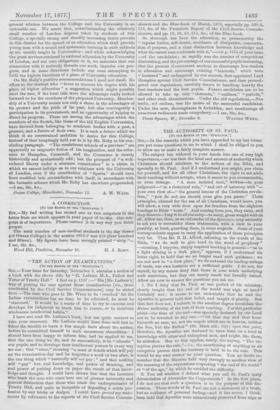" THE ACTION OF EXAMINATIONS."
[TO THE EDITOR OF THE "SPECTATOR."] SIR,—Your issue for Saturday, November 3, contains a review of a book with the above title by "II. Latham M.A., Fellow and 'Tutor of Trinity Hall." I find on p. 1337 :—" His [Mr. Latbam's] way of putting the case against those examinations [viz., those conducted by the Civil Service Commissioners] may be stated thus :—The man who goes to Mr. Wren to be coached' for the Indian examinations has no time to be educated, he must be
crammed.' It would be a waste of time to try to exercise and develope his judgment to teach him to reason, or to inculcate wholesome intellectual habits."
I have not read Mr. Latham's book, but am quite content to take your summary. Mr. Latham would have dono well had ho taken the trouble to learn a few simple facts about the matter, before he committed himself to such monstrous absurdities. I should have been happy to inform him, had he applied to me, that the one thing we do, and do successfully, is to " educate" our pupils, and to develope their intellectual powers in every way We can ; that " cram," meaning " a mass of details which will pay on the examination-day and be forgotten a week or two after, is the one thing which " assuredly will not pay ; " and that nothing will "pay" but real knowledge, real power of thinking, and real power of putting down on paper the result of that know- ledge and thought. I could have shown him that the lecturers who teach the men who come here are of greater university and general distinction than those who teach the undergraduates of Trinity Hall, and quite as incapable of degrading a noble pro- fession by any tricks or dodges. I could have proved my state- ments by references to the reports of the Civil Service Commis-
sioners and the Blue-book of March, 1876, especially pp. 483-4, 613, &c. of the Twentieth Report of the Civil Service Commis- sioners, and pp. 16, 19, 40, 311, &o., of the Blue-book.
So thorough has been the education, so praiseworthy the " regular habits, self-denial, avoidance of dissipation, concentra- lion of purpose, and a clear distinction between knowledge and what the carnal man confounds with it,"—vide p. 1374 of your issue —of the candidates ; so rapidly was the number of competitors diminishing, and the per-centage of our successful pupils increasing, that the present Government anxious to discourage free-traders in education and encourage existing "interests," which were " harassed" and endangered by our success, first appointed Lord. Hampton special Civil Service Commissioner, and then promul- gated new regulations, carefully drawn to handicap heavily the best teachers and the best pupils. Future candidates are to be allowed to take up only "elements," "outlines," "periods," and other such abominations. Under the old regulations,—Non multa, sed multum, was the motto of the successful candidates. Under the new, thoroughness is forbidden, and smatterings of numerous rudiments made compulsory.—I am, Sir, &e., Powis Square, W., November 8. WALTER WREN.






































 Previous page
Previous page